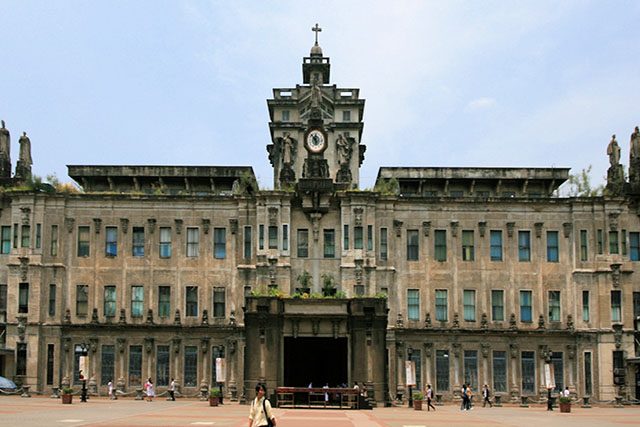Concerns on safety of medical students were raised online after Manila Mayor Isko Moreno Domagoso approved the University of Santo Tomas’ plan to resume face-to-face classes for medical and allied health programs.
Moreno approved the university’s plan to conduct limited face-to-face classes on Wednesday, adding that it should strictly observe mandated safety and health protocols.
UST subsequently announced the approval.
“The University of Santo Tomas secured the first of several approvals for the partial resumption of face-to-face classes, particularly for internships/clerkship/practicum, for the following programs: Medicine, Medical Technology, Physical Therapy, and Nursing,” the university said.
“The face-to-face activities, to be carried out while ensuring strict observance of safety and health protocols, will better equip our future medical and allied health professionals in serving their future patients competently and thus saving more lives,” it added.
The approval of partial resumption of face-to-face classes for medical programs came after UST officials met with Moreno to discuss the implementation of health and safety protocols during the conduct of the physical classes.
They also tackled the implementation of a contingency plan should UST students, faculty members or staff develop COVID-19 symptoms.
Domagoso also reminded UST officials that the resumption of this learning approach should not be forced among students.
“Huwag niyong pilitin ang ayaw, kasi baka may masabi sa inyo,” he said.
In the partial resumption of face-to-face classes, a joint memorandum order between the Commission on Higher Education and the Department of Health requires higher educational institutions (HEIs) to consult with and get clearance from their respective local government units first.
UST, in this instance, will then proceed to work on meeting the requirements and guidelines of CHED and the Inter-agency Task Force for Emerging Infectious Diseases (IATF-EID).
“Specific implementation guidelines will be released to stakeholders upon approval of the CHED and IATF,” the university said.
Mixed reactions
Some Filipinos welcomed UST’s back-to-school plan, saying that some medical knowledge cannot be learned in an online setting alone.
“More than any college courses, the medical and health related courses SHOULD START LIMITED FACE TO FACE so they can keep up with the new processes related to health especially managing new emerging diseases like COVID-19 which the online setting cannot offer,” one user said.
“I’m having mixed emotions with this… Gusto kong matuto (online set-up just isn’t working that well for me, especially with lab subjects) pero the risk…Ta’s ‘pag nadali ka ng virus, masakit sa bulsa ng mga magulang,” a student said.
Some, on the other hand, expressed worry as it will be implemented amid the still prevailing coronavirus pandemic. They hoped that the UST will release its health and safety protocols soon.
One Facebook user also noted other risks such as public transport and accommodations for students who live far from Manila, citing the need for financial aid.
“Majority of the students have no capacity to pay to live in the midst of pandemic. Lalo na ngayon down ang economy,” the user said.
The Philippine Medical Students’ Association also previously expressed concerns over the decision to return to school despite the still surging number of COVID-19 infections in the country.
In a statement on January 26, the PMSA urged CHED, the Association of Philippine Medical Colleges and other related authorities to release clear guidelines and plans for clerks and interns.
“The transition to face-to-face learning must not put additional financial burdens on clerks and interns, thus, questions on who will provide for protection of students (i.e. PPES, COVID-19 tests) as well hospitalizations, in the event they contract the disease while on duty, also need to be clarified,” the PMSA said.
Other HEIs approved
CHED last week gave other universities a green light to hold on-site classes and activities for medicine and allied health sciences program at limited capacity.
These included the Ateneo de Manila University and Our Lady of Fatima University in Valenzuela.
In October 2020, the IATF-EID allowed University of the Philippines College of Medicine–Philippine General Hospital to resume its clinical internship program last.
In a GMA News report, CHED Chairman Prospero De Vera III said that President Rodrigo Duterte favors the department’s decision.
“The president has approved my recommendation to have limited face-to-face within higher education institutions in medicine and allied health sciences in MGCQ (modified general community quarantine) areas and in GCQ areas where the students go into COVID-19 hospitals,” De Vera said.










